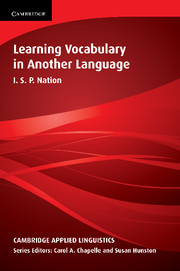Book contents
- Frontmatter
- Contents
- Series editors' preface
- Acknowledgements
- Introduction
- 1 The goals of vocabulary learning
- 2 Knowing a word
- 3 Teaching and explaining vocabulary
- 4 Vocabulary and listening and speaking
- 5 Vocabulary and reading and writing
- 6 Specialised uses of vocabulary
- 7 Vocabulary learning strategies and guessing from context
- 8 Word study strategies
- 9 Chunking and collocation
- 10 Testing vocabulary knowledge and use
- 11 Designing the vocabulary component of a language course Goals
- Appendixes
- References
- Subject index
- Author index
Series editors' preface
Published online by Cambridge University Press: 05 October 2012
- Frontmatter
- Contents
- Series editors' preface
- Acknowledgements
- Introduction
- 1 The goals of vocabulary learning
- 2 Knowing a word
- 3 Teaching and explaining vocabulary
- 4 Vocabulary and listening and speaking
- 5 Vocabulary and reading and writing
- 6 Specialised uses of vocabulary
- 7 Vocabulary learning strategies and guessing from context
- 8 Word study strategies
- 9 Chunking and collocation
- 10 Testing vocabulary knowledge and use
- 11 Designing the vocabulary component of a language course Goals
- Appendixes
- References
- Subject index
- Author index
Summary
There was a time when teaching and learning a foreign or second language was viewed primarily as a matter of controlling its grammar. ‘Methods’ as different as ALM and Grammar Translation had mastery of structures as their main goal, and vocabulary development was approached as some kind of auxiliary activity, often through memorising decontextualised word lists. The relatively minor importance attached to the lexicon was also visible in the scant attention paid to it by second language acquisition researchers until the last decade.
Fortunately, not everyone held this view, and a handful of pioneers in Nottingham, Swansea, Amsterdam, Haifa and elsewhere set out to rectify the situation through what were initially rather isolated research programmes. Among the first was Paul Nation, now recognised as one of the world's leading authorities on L2 vocabulary. He and a small group of colleagues, plus a succession of fine graduate students, have made Victoria University of Wellington a leading centre for almost every aspect of research on the lexicon, including a great deal of widely respected corpus-based work.
Nation's latest book, Learning Vocabulary in Another Language, makes a substantive contribution to an area now recognised as of central importance for grammarians, acquisition specialists, language teachers and language learners alike. Writing in an engagingly direct style, the author provides a comprehensive overview of what research findings show it means to ‘know’ a word; how best to teach words and collocations; vocabulary in L2 listening, speaking and writing; specialised lexicons; vocabulary learning strategies, and strategies for inferring the meaning of unknown words in context; chunking and collocation; vocabulary testing; and course design for vocabulary development.
- Type
- Chapter
- Information
- Learning Vocabulary in Another Language , pp. xiiiPublisher: Cambridge University PressPrint publication year: 2001

